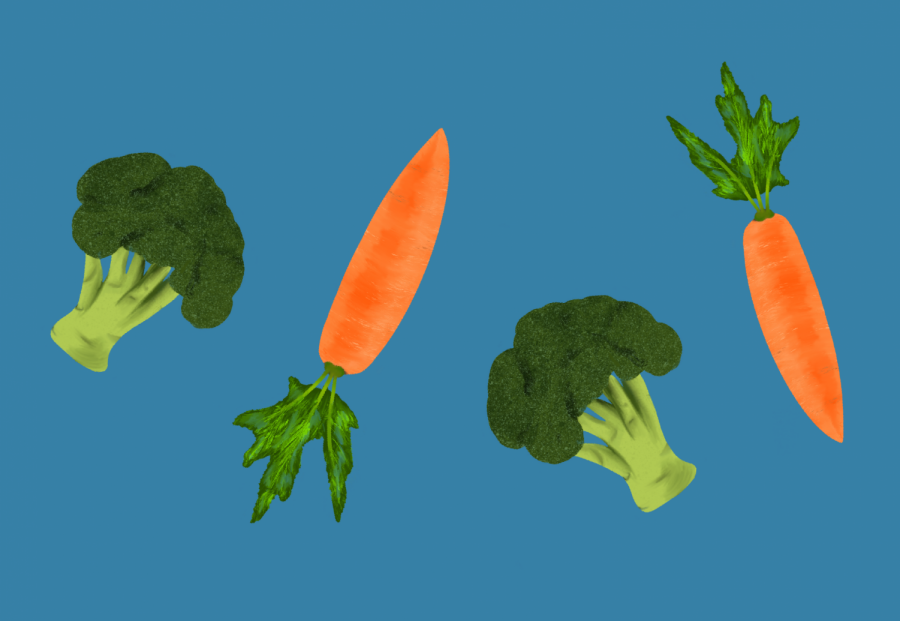Take advantage of your kitchen: Going vegetarian is easier than you think
February 15, 2021
A year ago, I would have never thought that in 2021, I’d be a vegetarian. Initially, the task seemed impossible. The thought of becoming a vegetarian made me shudder in fear of my pockets being emptied. My freshman and sophomore years, I had a meal plan; my meals included large portions of meat. When I lived in my sorority house, our chef especially loved cooking meat for us, which was more often than not undercooked. Many of my friends who were vegetarian complained — even I, a meat eater at the time, found myself agreeing with their points. I found myself frequently getting sick and feeling malnourished.
Fast forward to now, I no longer have a meal plan. I have my own kitchen, my own spices, my own fridge, my own space and, lo and behold, I can actually develop my own diet! No longer do I have to be limited to ingredient choices of mediocre overpaid chefs. When I started shopping for my own, I thought about my diet for the first time in my life. Learning that the pandemic was connected to wet markets and the much time spent reflecting in quarantine, I started to rethink what I had been eating. I was never a huge meat person. I did, however, love chicken nuggets — and I still do.
Because I did not like red meat, I decided to start off as a pollo-tarian — a person who does not eat meat with the exception of poultry and fish. Doing so was surprisingly easy, and then I set a goal to become a pescatarian. Still, I did not think I would go completely vegetarian, and when New Year’s Day came along, I decided to make a vow to see how long I could go without consuming any meat. In the process, I’ve actually saved a lot more money rather than spent more. If you are thinking about going vegetarian, don’t doubt yourself; it’s easier than you think. Here’s how you do it:
Invest in a food processor.
Having a food processor completely revolutionized the efficiency of cooking my meals. Although food processors do cost some money, the return greatly outweighs the cost. I use my food processor almost every day. Because vegetarians are at risk for iron deficiency, I incorporate a large amount of beans into my diet, with my favorite of all being chickpeas. With a few cans of chickpeas, or any kind of bean, really, you can remake all the food and meals that you love. So far, I’ve been able to cook vegetarian tacos, black bean burgers and dumplings. And the best thing about it? I’ve saved money in the process.
Get The Daily Illini in your inbox!
Be prepared to change your palette.
I used to hate beans. The texture of beans originally used to make me gag — some vegetables were another story, still being just as difficult to eat. Slowly, I started experimenting with different vegetables and beans I did not completely despise: spinach and cauliflower. The more time passed, the more I adjusted my intake. When I had made the full transition to vegetarian, I knew I was not going to lead a healthy vegetarian lifestyle without a sufficient protein source, not just including eggs. Because of this, I practically forced tofu, chickpeas and other plant-based proteins into my meals. Since then, my palette has evolved. Now every now and then, I find myself craving things like hummus, which used to make me turn up my nose.
Do sufficient research
Before making the big decision, think ahead and scope out nearby grocery stores to see if you have access to the products you need. Some great stores for vegetarian products on campus are Fresh International and County Market. Fresh International has a huge selection of soy products, including soy chicken, soy burgers and more. You can discover vegetables you’ve never even heard of.
Going vegetarian is not for everyone, especially if you have any particular health conditions. Additionally, there are different types of vegetarianism: lacto-ovo, which includes eggs and dairy, ovo-vegetarian, which includes eggs, lacto, which only includes dairy, and veganism, which involves no animal products. Each type of diet restricts different types of nutrients. If you are considering cutting out all animal products, be wary of vitamin deficiencies, especially B-12 and iron, and consult your doctor.
Be gradual and forgiving with yourself.
As I mentioned previously, going vegetarian was a gradual process for me, starting with eliminating red meat, then eventually all meat. This took me a few months and has been an entire process. Just like any other new lifestyle, you’re bound to have a slipup every now and then. Even if you are concerned about iron deficiencies, you don’t have to become a full on vegetarian to make a difference. Look into semi-vegetarian diets. By going pollo-tarian or pescatarian, you are still taking action to minimize your carbon footprint.
Meghan is a junior in LAS







